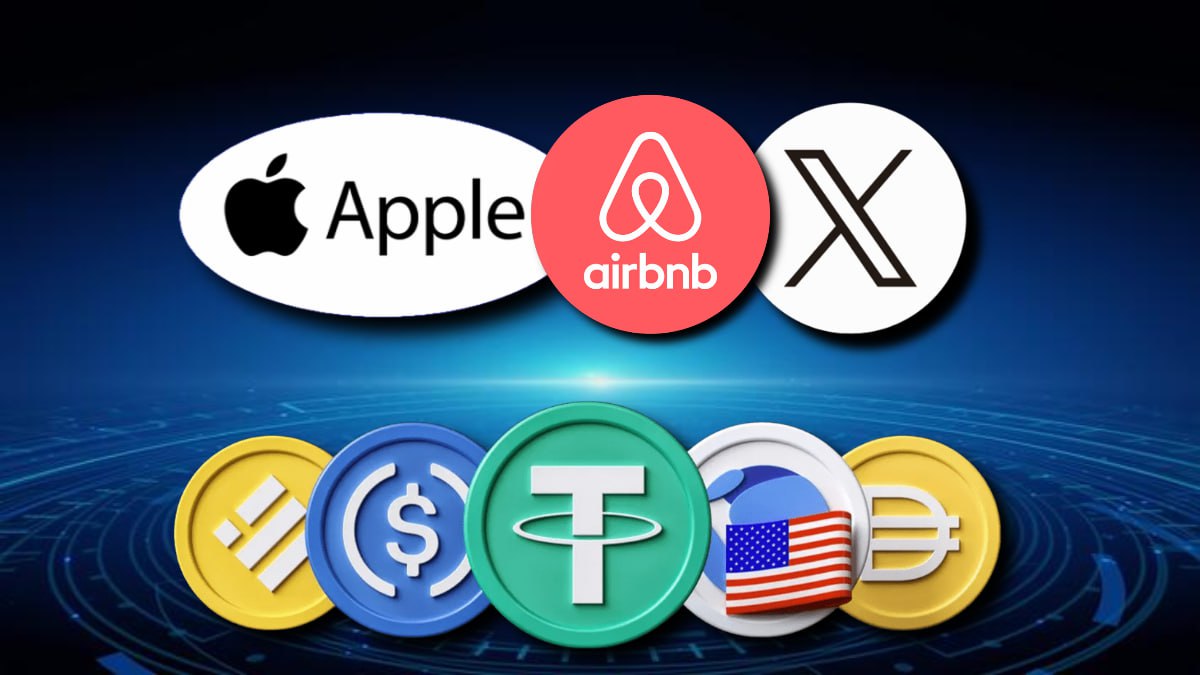Major technology companies Apple, Google, X (formerly Twitter), and Airbnb are reportedly delving into the potential integration of stablecoins to enhance their payment systems, reflecting a growing interest in blockchain-based solutions.
 This move comes as the global payments landscape shifts toward more efficient and cost-effective alternatives.
This move comes as the global payments landscape shifts toward more efficient and cost-effective alternatives.
Apple is in discussions with Circle, the issuer of the USDC stablecoin, to explore integrating stablecoins into its Apple Pay infrastructure. These talks, which began earlier this year, aim to leverage blockchain technology to streamline transactions and reduce costs, aligning with Apple’s broader fintech ambitions.
Airbnb is engaging with Worldpay, a global payment processor, to investigate stablecoin adoption as a means to cut fees associated with traditional card networks like Visa and Mastercard. This initiative could offer hosts and travelers faster, cheaper cross-border transactions, particularly in markets with limited banking access, enhancing the platform’s global reach.
 Elon Musk’s X is pushing to incorporate stablecoins into its upcoming X Money app, designed to facilitate peer-to-peer payments and evolve into an "everything app."
Elon Musk’s X is pushing to incorporate stablecoins into its upcoming X Money app, designed to facilitate peer-to-peer payments and evolve into an "everything app."
The company is in talks with Stripe, a leading payment processor, to enable this integration, building on its earlier partnership with Visa for a digital wallet.
Meanwhile, Google Cloud has already taken a concrete step forward by accepting payments in PayPal’s PYUSD stablecoin from select clients.
Rich Widmann, head of Web3 strategy at Google Cloud, described this development as potentially "the biggest upgrade to payments since the SWIFT network," highlighting its seamless integration into existing billing systems.
 Also read:
Also read:
- Arthur Hayes Labels Crypto Company IPOs the New ICO Boom of 2017
- Metaplanet to Launch Japan’s Largest Stock Issuance to Acquire 1% of All Bitcoin
- U.S. to Implement Virtual Reality Screening for Touchless Airport Security Checks
This surge in stablecoin interest among Big Tech firms coincides with a more crypto-friendly policy environment in the U.S. and growing market demand for digital assets.
However, challenges remain, including compliance risks and the selection of trustworthy stablecoin issuers.
As these companies navigate this evolving landscape, their moves could signal a transformative shift in how digital payments are conducted worldwide.
Author: Slava Vasipenok
Founder and CEO of QUASA (quasa.io) - Daily insights on Web3, AI, Crypto, and Freelance. Stay updated on finance, technology trends, and creator tools - with sources and real value.
Innovative entrepreneur with over 20 years of experience in IT, fintech, and blockchain. Specializes in decentralized solutions for freelancing, helping to overcome the barriers of traditional finance, especially in developing regions.
This is not financial or investment advice. Always do your own research (DYOR).






